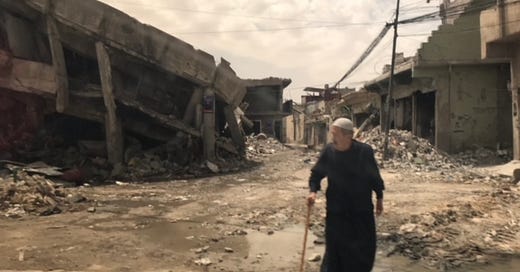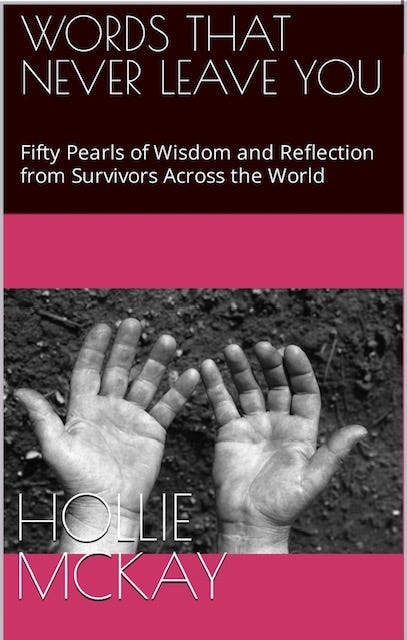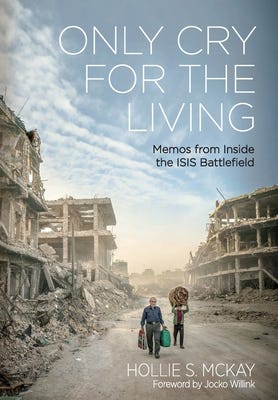This is how ordinary people become extraordinary in times of war
A topic of endless fascination and the focus of my speaking work in 2024
Civilians left inside the abandoned city barely bother to look up each time a mortar whips the air or a Howitzer missile burrows itself into muddy earth close by. Bombs rain down around us. I fear it will never stop, but when it does, the silence is much more frightening – the eerie elastic seconds where I can only wait for something to snap.
Yet what I do not observe is pity. What I see is ordinary townsfolk in the most extraordinary of circumstances. Parents light fires for warmth, and children read from blistered schoolbooks; everyone appears to accept this searing version of a new normal, moving on with daily chores and doing whatever it takes to feed their families. A man rides his rusty bicycle along the frozen, shattered roads toward whatever is left of his modest home. I say home loosely. There is no single dwelling in this now thinly populated city that has not been burned, butchered, or blown apart.
I am often struck by how ordinary people, with no formal training or skills, are forced to become extraordinary at the drop of a hat — or a bomb. The resilience to withstand the pain (both physical and psychological), to push through the darkness, and to find the thread of hope in the bundle of misery has left me both perplexed and inspired.
The people whose stories I am sharing with you all today aren’t collated from the Western lens of the best of the best on the planet, the top CEOs or athletes, or the cream of the crop in Hollywood. These people will never have their names in lights, amass millions of dollars, or make TIME Magazine’s 30 Under 30. But from my lens, they are the most exceptional humans imaginable – the people who enrich my spirit and teach me more about life and greatness than any Instagram influencer ever could.
There’s a reason that the word “extraordinary” is just “ordinary” with “extra” added to it. Going above and beyond is the key to achieving great things – do what is required and then do something extra.
So, what lessons have I learned about how the ordinary becomes extraordinary in times of conflict that I can apply to my own life, whether here or afar? While I have many lessons on my ever-growing list, here is a snippet of a few of the most important lessons learned…
DON’T COMPLAIN
Life throws some horrible curveballs at all of us, but extraordinary people learn to adapt. And that is what those enduring a life at war do at every moment.
I remember encountering thousands of Yazidis, an ethnoreligious minority in Iraq who had committed genocide against them when the Islamic State terrorist group assaulted their lands, residing with next to nothing in a squalid camp on the Syrian border. They had lost everything, including many of their family members, with many more still missing.
But not a single Yazidi complained. It made no sense to complain. They were all in this together, and all they could do – and all we can do when the going gets tough – is use whatever energy we have left to go further, to survive a little longer, to search for solutions rather than dwell on the problem.
Rather than lamenting, extraordinary people own their situation and use their experience to help others. Take Manal, whose home was struck by an Assad regime bomb at the height of her country’s war when she was just ten years old.
Manal undergoes surgeries in California thanks to an NGO called the Burnt Children Relief Foundation. Despite severe burns to her face and almost all of her body, she views herself as one of the lucky ones. Manal lost her fingers the day her house was bombed. Still, she has taught herself to sketch. Manal tells me she would not turn back the clock even if she could because now she possesses a level of empathy she would never have had if she had not been critically injured.
“I’ve learned a lot. It makes me braver and makes me feel other people’s pain, a feeling only people in my situation would know. I feel their pain and want to help them,” Manal told me softly. “I want to be the voice for other people.”
Manal owns her story. She accepts the past and embraces the present. She looks forward to her future. What does war teach me about how the ordinary become extraordinary? They know they can. We can all heal. The human mind and the human body are incredible creations.
DON’T COMPLAIN
Life throws some horrible curveballs at all of us, but extraordinary people learn to adapt. And that is what those enduring a life at war do at every moment.
I remember encountering thousands of Yazidis, an ethnoreligious minority in Iraq who had committed genocide against them when the Islamic State terrorist group assaulted their lands, residing with next to nothing in a squalid camp on the Syrian border. They had lost everything, including many of their family members, with many more still missing.
But not a single Yazidi complained. It made no sense to complain. They were all in this together, and all they could do – and all we can do when the going gets tough – is use whatever energy we have left to go further, to survive a little longer, to search for solutions rather than dwell on the problem.
Rather than lamenting, extraordinary people own their situation and use their experience to help others. Take Manal, whose home was struck by an Assad regime bomb at the height of her country’s war when she was just ten years old.
Manal undergoes surgeries in California thanks to an NGO called the Burnt Children Relief Foundation. Despite severe burns to her face and almost all of her body, she views herself as one of the lucky ones. Manal lost her fingers the day her house was bombed. Still, she has taught herself to sketch. Manal tells me she would not turn back the clock even if she could because now she possesses a level of empathy she would never have had if she had not been critically injured.
“I’ve learned a lot. It makes me braver and makes me feel other people’s pain, a feeling only people in my situation would know. I feel their pain and want to help them,” Manal told me softly. “I want to be the voice for other people.”
Manal owns her story. She accepts the past and embraces the present. She looks forward to her future. What does war teach me about how the ordinary become extraordinary? They know they can. We can all heal. The human mind and the human body are incredible creations.
REMEMBER MOST PEOPLE ARE GOOD PEOPLE
For so many people who have spent their lives entrenched in war after war after war, so much so that it is etched into their bones of the people who came with them and before them, it would be easy to believe that the world is an evil place rife with killers and thieves and megalomaniacal world leaders.
However, I rarely see that among civilians – the ordinary who become extraordinary because, despite all they have suffered, they want nothing more than to laugh and love.
They remember that most people in our world are good people. Most people among us, including those sitting right next to you, diligently remember to walk and feed their pets; they hold their child’s hand to cross the road, take time to wish a good friend a Happy Birthday, and they won’t let a loved one live on a muddied sidewalk without a roof over their heads.
Most people are good people. The extraordinary see the upside, and they see the best in people.
For speaking queries that expand upon this topic, which I will be speaking and writing about more in 2024 please contact meta@metaspeakers.org
PLEASE CONSIDER A PAID SUBSCRIPTION TO THIS SUBSTACK TO HELP KEEP INDEPENDENT, AGENDA-FREE WRITING AND JOURNALISM ALIVE. THANK YOU SO MUCH FOR YOUR SUPPORT.
Follow me on Instagram and Twitter for more updates
HOLLIE’S BOOKS (please leave a review)
** Short read of meaningful lessons gleaned from the ordinary forced to become extraordinary
Order your copy of “Afghanistan: The End of the US Footprint and the Rise of the Taliban Rule” due out this fall.
For those interested in learning more about the aftermath of war, please pick up a copy of my book “Only Cry for the Living: Memos from Inside the ISIS Battlefield.”
If you want to support small businesses:







